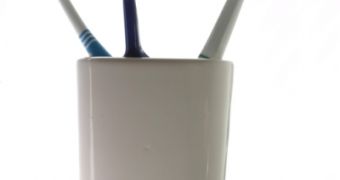We might imagine that, just because our bathroom is always clean from that much scrubbing and sanitizing of the tiles and what-not, it’s the one room in the house where we are free of bacteria and germs – or at least, that there are fewer of them. Far from that being the case, experts also warn about our oral hygiene, by keeping our toothbrush as farther away from the toilet as possible.
According to Fitness Magazine, a recent research by Gerba has shown that, even if we close the lid of the toilet as we flush, bacteria from it is sprayed all over, including on the toothbrush. Granted, the bacteria dies when the brush is no longer wet but, still, it is highly recommended we kept it in a drawer or in the medicine cabinet, preferably with a protection cover as well.
“Microorganisms are ejected when you flush the toilet and land all over the bathroom, even if you close the lid, according to research by Gerba. But you probably won’t get sick from this. ‘When the toothbrush dries, most of the organisms will die anyway,’ says Gerba. Just keep your toothbrush as far away from the toilet as possible, or put it in the medicine cabinet, he says. If someone in the house is ill and using the same bathroom as you are, her germs could be spread this way.” the aforementioned e-zine writes, confirming the myth that toothbrushes in the vicinity of the toilet are really not a good idea.
Whereas microorganisms from the toilet on the toothbrush might not be hazardous to our health, not brushing properly or at least three times a day can affect our body in ways we probably never thought of before, as a recent study has shown. According to the research, brushing promotes gum health, while also decreasing the risks of having a heart attack. This is possible because people who suffered a heart attack were found to have more bacteria in their mouth than those who did not, wherefrom the conclusion that brushing can eliminate them.
“The message here is that even though some specific periodontal pathogens have been found to be associated with an increased risk of coronary heart disease, the total bacterial pathogenic burden is more important than the type of bacteria. In other words, the total number of ‘bugs’ is more important than one single organism.” Oelisoa Andriankaja, lead researcher, was telling MSNBC at the time the study was made public. Although the research was not able to explain in detail how brushing could prevent a heart attack, it did show that oral hygiene was closely linked to overall health, but further research is to be done in this sense.

 14 DAY TRIAL //
14 DAY TRIAL //